The 16th Utah Film Center’s Damn These Heels LGBTQ Film Festival offers 23 films and two programs of short films. Utah filmgoers have a rare opportunity to see some of the best examples of LGBTQ cinema today, as 20 films are receiving their Utah premieres and two others having their first Utah screenings since their premieres at last January’s Sundance Film Festival. The Utah Review screened many of the films in advance and the following summarizes the distinguished lineup of this year’s festival.
Changing the Game (Michael Barnett, 88 mins., 2019, U.S.) — July 12, 7 p.m., Jeanné Wagner Theatre
The opening film for the festival is a quintessential encapsulation of the current sociopolitical and cultural zeitgeist in our country. It also is one of the films supported through the Utah Film Center’s fiscal sponsorship program. It synthesizes the main stories of three young transgender athletes: Mack Beggs, a Texas wrestler who was forced to compete on the girl’s team; Sarah Rose, a New Hampshire skier who feels that she must constrict her actual athletic potential and Andraya Yearwood, a Connecticut track star who must contend with spectators that believe she has an unfair advantage over other girls on the track and field team. The film captures the expected intense scrutiny each athlete faces along with the challenges of overcoming tension with resilience. Notable is how each family supports them – in particular, Beggs’ grandparents, who defy conventional expectations.
Bit (Brad Michael Elmore, 94 mins., 2019, U.S.) – July 12, 10 p.m., Jeanné Wagner Theatre
Bit is excellent late evening fare, paying nostalgic homage to the genre of vampire stories while adding the right sociopolitical bite in its narrative about feminism. The film starts tentatively but gathers a full head of steam midway, especially when Duke, the lead vampire explains their mission to Laurel (the film’s protagonist: “The world is a meat grinder, kid. Especially if you’re a woman. I don’t think you need a Power Point presentation to know that one is true. We’re politically, socially and mythologically fucked. Our roles are secondary, our bodies suspect, alien, other. We were made to be monstrous so let’s be monsters. Let’s be gods.” Laurel’s background adds an intriguing layer that could have been amplified a bit more but attentive audience members will understand it when Laurel asks about her own gender identity fitting into the group and its rules.
Shorts Program I (73 mins.) – July 13, 9 a.m., Jeanné Wagner Theatre
The first of the festival’s two short film programs comprises documentaries focusing on trans* experiences and women’s contributions in the LGBTQ+ community. They include Invisible Women (Alice Smith), chronicling a half century of activism through the views of two women; Candy’s Crush (Roberto Nascimento), about Leilani Tominiko, a trans woman professional Samoan/Kiwi wrestler); A Sublime Failure (David Quantic), about the director’s long obsession with Showgirls, one of Hollywood’s biggest box office failures. Other films include Mom’s Clothes (Jordan Wong), about the clothes one wear’s after coming out; Grandmother and Me (Kat Cole) about the director creating a cinematic letter to her fiancé’s only grandparent that captures the impact of transphobia, and The Bony Lady (Thiago Zanato and Adriana Barbosa), featuring Arely Vazquez, a Mexican trans woman from Queens, New York, and leader of the Saint Death Cult.
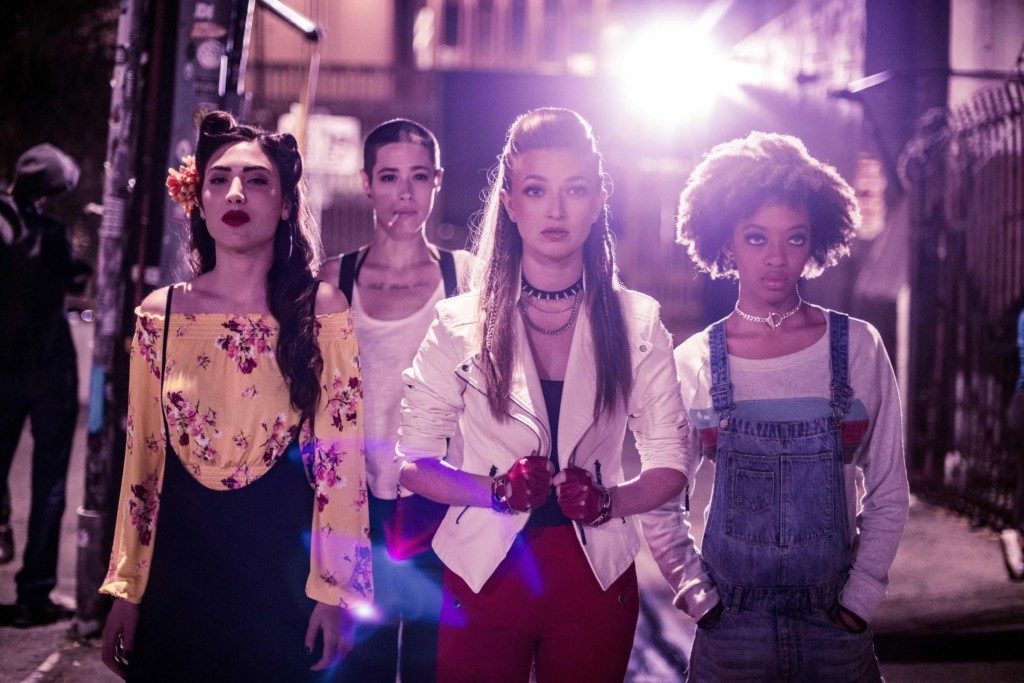
Billie and Emma (Samantha Lee, 107 mins., 2018, Philippines, English and Tagalog with English subtitles) – July 13, 9:15 a.m., Black Box Theatre
This Filipino film is set primarily in the community of St. Gerard’s Catholic School, where homosexuality is regarded as a sin. Emma is the school’s star pupil who hopes to win a scholarship while Billie has transferred from Manila to this community, with the assistance of her aunt who also teaches at the school. The two girls discover their relationship while working together on a school project and while they try to be discreet about their affection for each other, Emma also learns that she is pregnant. There is an innocent charm and sweetness to a simple story about two teens falling in love but some audience members might have different ideas about how the film’s biggest narrative challenge is resolved. Viewers also will note the prevalent appearance of Rita Mae Brown’s debut novel published in 1973, Rubyfruit Jungle, an autobiographical story of the author’s emerging recognition of lesbianism in her teens.
Socrates (Alexandre Moratto, 70 mins., 2018, Brazil, in Portuguese with English subtitles) – July 13, 10:45 a.m., Jeanné Wagner Theatre
A stronger film as it contrasts Billie and Emma’s inherent sweetness with the young gay Brazilian’s more volcanic storyline, Socrates has had an active festival circuit portfolio. The film’s production design includes contributions by teens who participated through the Instituto Querô, an NGO from Santos that introduces economically disadvantaged young people to hands-on experiences in the media arts. This narrative opens as Socrates, 15, who lives in the Baixada Santista district of São Paulo, discovers that his beloved mother has died. Socrates is determined to work and live independently, aware that his father or other relatives would not abide his presence.
Beset at every point, he meets Maicon, a slightly older man, and their relationship is mercurial, at best. Think about the film in the context of Brazil’s current politics, defined by its president Jair Bolsonaro and his anti-gay platform. Indeed, Socrates’ epiphany echoes the legacy of the philosopher with whom he shares his name.
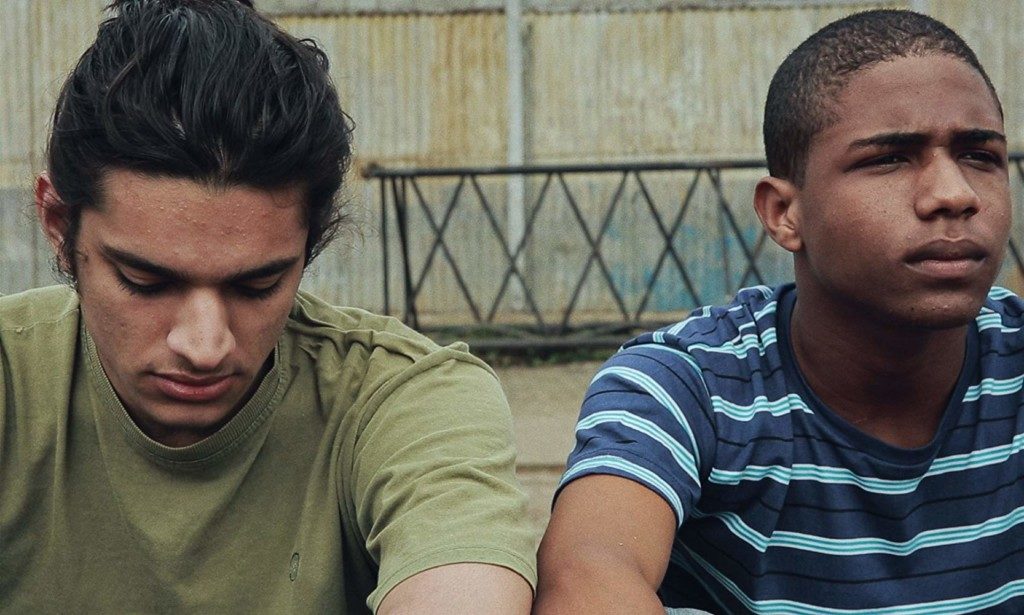
Gracefully (Arash Eshaghi, 60 mins., 2019, Iran, Farsi with English subtitles) – July 13, 11:30 a.m., Black Box Theatre.
A world premiere, Gracefully is an exquisite documentary set in rural Iran and focusing on a genderqueer drag artist whose dance movement and handsewn costumes define grace in its most elegant aesthetic. Before the 1979 Islamic Revolution, he could perform freely without worries about repression, censorship or worse. Working as a cow farmer, he struggles to find the most discreet opportunities to express his art, worried that it will be forever lost. The film also touches on a curious double standard in Islamic society, as men are permitted to portray women in religious-themed plays. Eshaghi’s visual presentation of dance scenes resonates in the film’s theme of the fragility of memory and cultural preservation during a time of intense suppression and censorship. It is a rare glimpse for American audiences into the lives of Iranians who live in quiet rural areas far from Tehran. This screening will open with a short film.
For They Know Not What They Do (Daniel Karslake, 91 mins., 2019, U.S.) – July 13, 12:45 p.m., Jeanné Wagner Theatre
The combination of Karslake’s direction and Nancy Kennedy’s editing turn this documentary into one of the finest among recent cinematic statements about the intersectional dynamics of religious conviction and the LGBTQ+ community. Packing a formidable emotional punch that rightly pushes aside any sense of complacency, the documentary offers significant counterpoints: a young man’s grief and guilt after losing friends in the Pulse nightclub massacre in Orlando three years ago; Sarah McBride, one of the country’s leading transgender rights activist, and the support she has received from her parents, and the heartbreaking story of an evangelical couple’s efforts for atonement after their gay son died from a drug overdose. Indeed, the story of the son’s parents, Bob and Linda Robertson, leads to complicated, juxtaposed emotions but it also offers a crucial lesson about how their story has led to changing the stories of others with a newfound sense of affirmation.
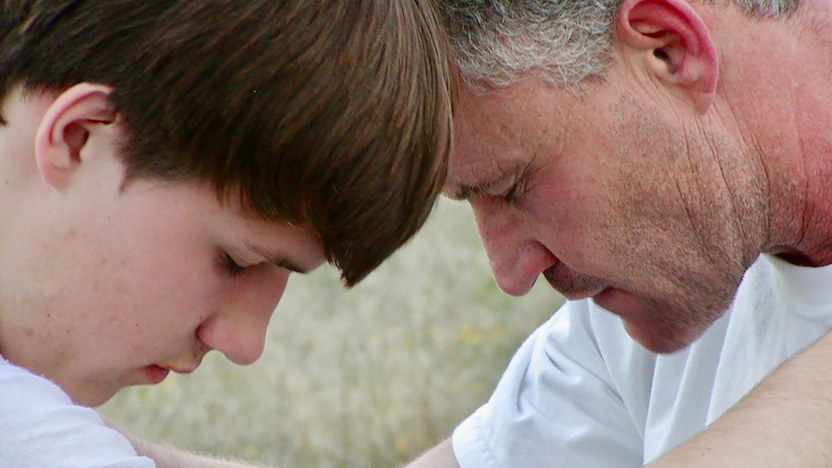
Ma Vie en Rose (Alain Berliner, 88 mins., 1997, Belgium/France, French with English subtitles) – July 13, 1:15 p.m., Black Box Theatre
Guest programmer Jordan Blok selected two films that bookend two decades in the evolving portrayals of queer relationships. The first is a cinematic classic: Ma Vie en Rose, which won honors as the Best Foreign Language Film for the 1998 Golden Globes. Ludovic, 7, shocks everyone, when she dresses as a girl and insists that it is her real identity. Blok says the film was one of the most transformative and transcendental in their childhood. The film deftly contrasts two views driven by separate forces: Ludovic who is convinced of her truth discovery, and the adults who worry and respond in ways that reflect their own unjustified fears and prejudices.
Retablo (Alvaro Delgado Aparicio, 95 mins., 2017. Peru, Quechua and Spanish with English subtitles) – July 13, 3 p.m., Jeanné Wagner Theatre
A frequent award winner on the festival circuit, Retablo’s honors include Crystal Bear Special Mention for Best Feature Film and a Teddy Jury Newcomer Award for Best First Feature Film at last year’s Berlin International Film Festival. The film is about a Segundo, 14, who makes the altarpieces that are among the most recognized pieces of Peruvian culture and is stunned seeing his father in situations that he never believed he ever would witness.
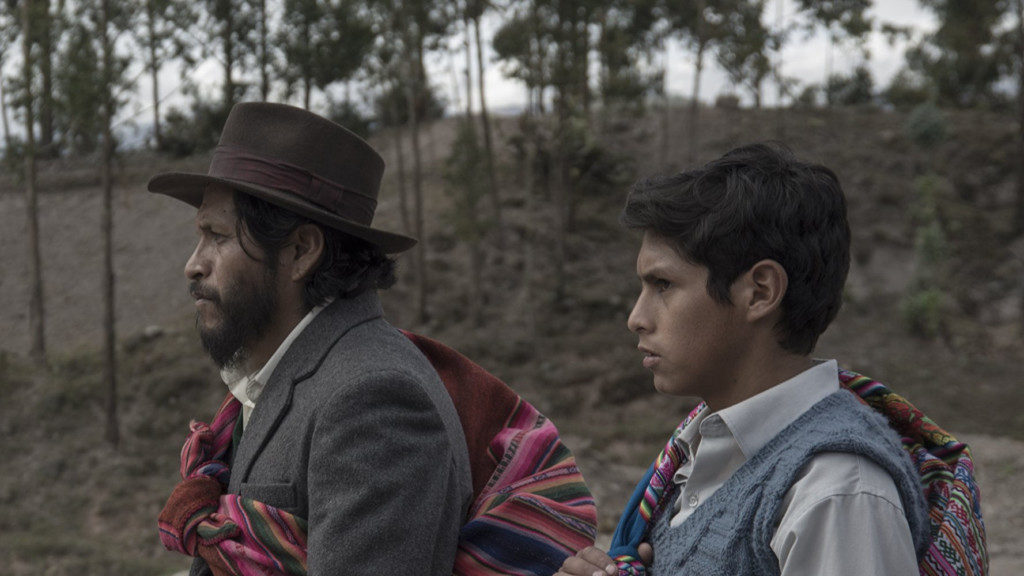
No Box For Me. An Intersex Story (Floriane Devigne, 58 mins., 2018, France, French with English subtitles) – July 13, 3:30 p.m., Black Box Theatre
Eschewing a conventional documentary approach, this impressive nonfiction film incorporates animation and a distinct poetic tone to address an issue that makes even many members of the LGBTQ+ community awkward in discussing openly. Through the stories of Deborah and M, both in their mid-twenties, the conversation about what intersex really means opens up to nuances in vocabulary, expressions and representations that illuminate and enlighten everyone. The film excels at taking a topic that has been burdened by the clinical lexicon of medical science and transforming it into a smart, personable, warm-hearted presentation which imparts knowledge about a historically taboo subject in the most effective – and clever – ways possible.
Wounded By the Wind (Las Heridas del Viento) (Juan Carlos Rubio, 75 mins., 2017, Spain, Spanish with English subtitles) – July 13, 5:15 p.m., Jeanné Wagner Theatre
A rich literary sense infuses this smartly presented story about a young man who is packing up his late father’s possessions and discovers a set of discreetly hidden letters. These letters lead to an unexpected revelation that pierces the orthodox image he had of his father. And, several meetings with the writer of those letters direct the young man toward his own resolution about the unsatisfying relationship he had with his father. Minimalistic and stark in overall presentation, the film functions like a theatrical production at times, as both main characters break the fourth wall. The script is based on a play this Andalusian director wrote.

Seahorse (Jeanie Finlay, 91 mins, 2019, U.K.) – July 13, 5:45 p.m., Black Box Theatre
An intriguing creative decision sets up this film about a trans man who becomes pregnant and carries his child to term. The father-to-be initially set out to document his pregnancy fearing that someone else might sensationalize the story so he already had assembled a production crew. He eventually entrusted the director to lead the film, which raises new perceptions about biology, masculinity and how individuals define their identities.
Sister Aimee (Samantha Buck and Marie Schlingmann, 97 mins, 2019, U.S.) – July 13, 7:30 p.m., Jeanné Wagner Theatre
One of two films on the Damn These Heels slate that screened at Sundance earlier this year, this film about Sister Aimee Semple McPherson is, as the opening indicates, based on “five and a half percent truth and the rest is imagination.” McPherson is a mysterious figure in the American pantheon of pop culture but this female evangelist also was an astute communicator who leveraged radio and publicity gimmicks to the envy of others in the emerging Hollywood scene in Southern California. The film, therefore, is appropriately weird.
As Buck said in her artistic statement prior to the Sundance premiere, “She was a woman who seemed to have it all. Why then would she want to throw it all away when she ‘mysteriously’ disappears in 1926? At the height of her popularity? That question was the motor for our own exploration of Aimee’s story. But, in contrast to other accounts, our answers are entirely fictional. We don’t look for factual truth in her journey. Instead we look for a more timeless truth that says something about female ambition, the quest for immortality and most of all the struggle for women to control their own narratives. It becomes a story about the power of storytelling and spectacle itself.”

Jonathan Agassi Saved My Life (Tomer Heymann,106 mins, 2018, Israel/Germany, English and Hebrew with English subtitles) – July 13, 8 p.m., Black Box Theatre (NOTE: Open to 18 and older.)
At one point, Agassi was one of the world’s most visible porn actors. Now, nearly four years after he left the industry and returned to his native Tel Aviv, the explicit and candid biographical documentary about his life and work has commanded well-deserved attention on the international festival circuit. Tomer Heymann and Barak Heymann (brothers and director and producer, respectively) know how to communicate the stories of individuals who are complex, exacting and imposing in their creative endeavors. Two years ago, the Utah Film Center screened the dramatic, sometimes brutally emotional, cinematic portrait of Israeli choreographer Ohad Naharin, known as the father of Gaga dance movement artistry.
There is a similar tone in this film about Agassi, whose last name is really Langer. We see his parents in different perspectives: a mother completely open and unconditional in her live and an estranged father with whom there always has been distance and mistrust. There also are graphic scenes about his use of hard drugs at the time. In a recent interview with Attitude magazine, Agassi says, “It’s an important film and one thing that Tomer said and, now I am connecting to it on another level, is that in every film you see drugs, you always see it in a sexy way. You will always see it in a club, and everybody is sweaty and kissing but nobody shows the problems when you collapse on the floor, twisted up and you’re screaming. Nobody shows those moments.”
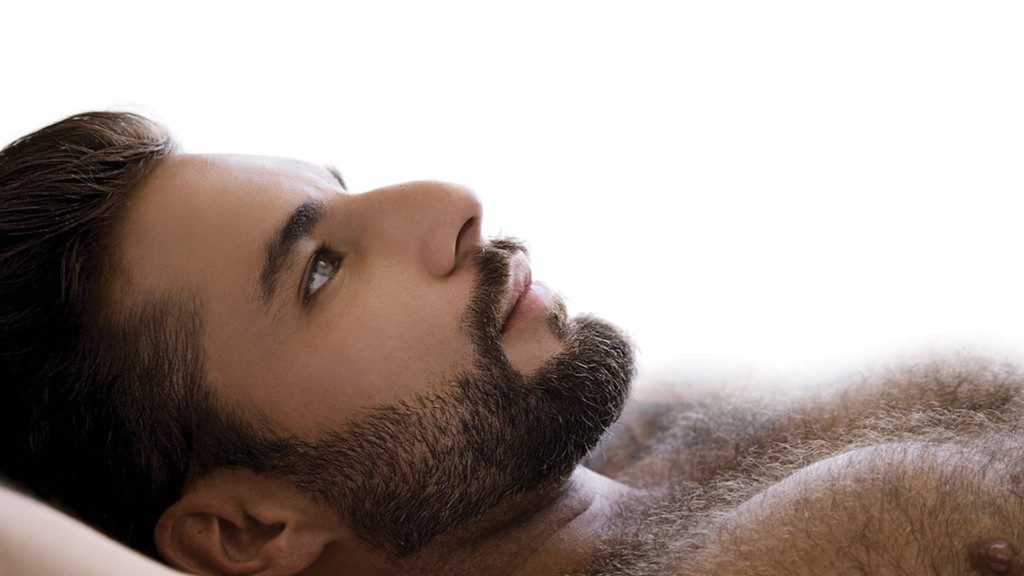
Unsettled (Tom Shepard, 81 mins, 2019, U.S.) – July 13, 9:45 p.m., Jeanné Wagner Theatre
Timely and clarifying, this documentary focuses on four refugees now in the U.S. because of anti-LGBTQ+ oppression in their respective homelands: Cheyenne and Mari (Angola), Subhi (Syria), and Junior (Democratic Republuc of the Congo). The film underscores just how difficult the refugee and asylum processes always have been but also the challenges as the numbers for approved refugee status have shrunk significantly during the current Administration.
Based initially in the San Francisco Bay Area, one of the nation’s most expensive for housing and quality of life, the four individuals try to adapt quickly and secure living quarters and productive incomes. While they are in more welcoming environments, they exert much effort to realize the sort of victories many Americans see as routine or more accessible. For Subhi and Junior, especially, that includes contending with an unfamiliar gay social and dating scene.
A Night at Switch n’ Play (Cody Stickels, 72 mins, 2019, U.S.) – July 13, 10:15 p.m., Black Box Theatre
Snappy, bawdy, titillating and intelligent, this film chronicles a show scene that would be the envy of any enlightened queer community. It is not just a safe space for exploring the vast canvas of numerous gender identities, body positivity and rightly enjoyed sexual imagery but also an entertainment venue that puts drag shows, burlesque and performance art in an avant-garde laboratory for creative expressions. Audiences will enjoy the likes of Pearl Harbor, Divina Gransparkle, Vigor Mortis, K James, and Nyx Nocturne, hosted by femmecee Miss Malice and her burlesque sidekick Zoe Ziegfeld.
Olivia (Jacqueline Audry, 96 mins, 1952, France, French with English subtitles, newly restored) – July 14, 9 a.m., Jeanné Wagner Theatre
Made nearly 70 years ago, Olivia’s appearance at the festival is notable for several reasons. First, it represents the work of a female director, a rarity of the time in Europe as it had been in the U.S. second, unlike many other films of the time, it has not been available in formats for home viewing because of its lesbian-based storyline and holders of the rights to the film have shied from having it presented at queer-themed cinematic festivals. In France, Audry was nearly as well known as Agnès Varda, the filmmaker who recently died. This newly restored film is adapted from a novel penned by the director’s sister Colette Audry. Olivia is a new student at an all-girls’ finishing school operated by two female headmasters, each competing for the alliance of support from the students. It is a magnificent, surprising peek into France’s audacious cinematic movement that coalesced during the 1950s.
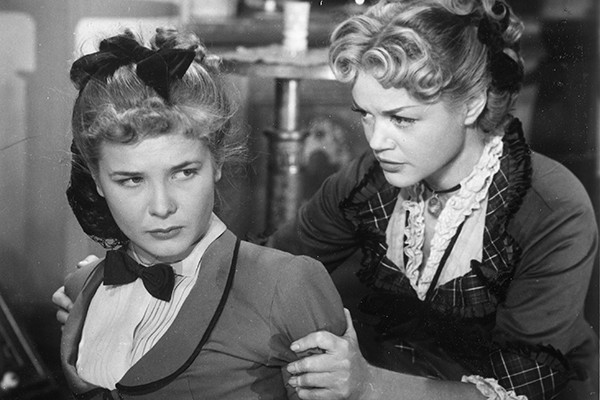
Tucked (Jamie Patterson, 120 mins, 2018, U.K.) – July 14, 9:15 a.m., Black Box Theatre
Perhaps best described as a narrative fusion of The Full Monty and Priscilla, Queen of the Desert, this film centers on an aging and lonely drag queen widower in Brighton. Diagnosed with terminal cancer and expected to live only a few weeks, he is struck one night by the appearance of Faith, a 21-year-old singer, who, as a gesture of gratitude, helps the dying man reconnect to his family.
Adam (Rhys Ernst, 95 mins, 2019, U.S.) – July 14, 11:15 a.m., Jeanné Wagner Theatre
Audiences undoubtedly will enjoy this comedy-of-errors, coming-of-age film set in 2006, which also transmits a hefty serious theme along the way. The film, based on a novel by Ariel Schrag, premiered at Sundance earlier this year. Enjoying the summer before his senior year of high school, Adam goes to Brooklyn to stay with Casey, his older sister. He hopes to meet a girl and, more importantly, lose his virginity. He is stymied in his first attempts because his sister’s circle of friends are active in the local LGBTQ+ community and Adam tags along, getting into queer bars even though he is underage and attending rallies for gay rights issues (keep in mind this is nearly a decade before marriage equality was legalized). Adam finally meets Gillian but she assumes that he is trans and, henceforth, the chain reaction of errors and awkward acts is unleashed.
Fabulous (Audrey Jean-Baptiste, 47 mins, 2019, French Guiana, French with English subtitles) – July 14, 11:45 a.m., Black Box Theatre
An excellent documentary, the film highlights Lasseindra Ninja, who went to New York to perfect the artistry of vogueing and now has established her own House of Ninja in Paris with Miss Stephie Mizrahi. It is a fast-paced chronicle of a French Guiana citizen returning after a 13-year absence to her roots and mentoring a new generation of performers. Lasseindra’s confidence is instrumental to guiding her students who live in communities that look with more than a critical eye on genderqueer performance art. A gifted performer, Lasseindra is a natural teacher who exemplifies humility and respect as she instills the professional ethic of creative expression in her appreciative protégés.
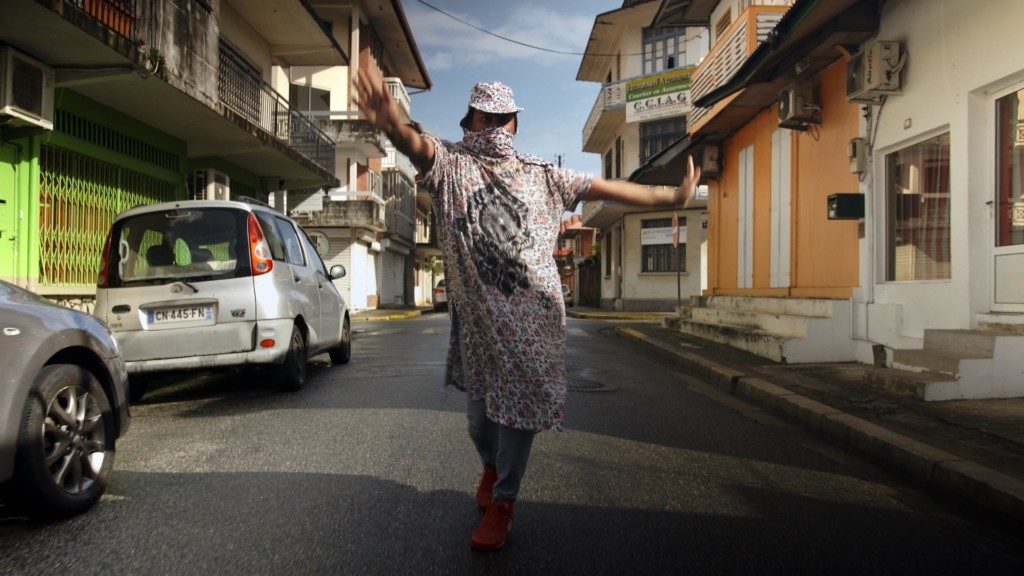
Consequences (Posledice) (Darko Stante, 95 mins, 2018, Slovenia, Slovenian with English subtitles) – July 14, 1:30 p.m., Jeanné Wagner Theatre
With at least eight awards to its credits especially for strong acting performances, the film synthesizes the themes of gay identity and the environment of youth detention centers. Indeed, the film portrays without restraint a failed system of justice and reform for young people who have been detained because of criminal behavior. Meanwhile, the main character struggles to resolve his inner conflicts about his sexual identity and acts out instead to prove that he lives up to masculine expectations.
Shorts Program II (90 mins.) – July 14, 1:45 p.m., Black Box Theatre
This second shorts program comprises dramatic and comedic films offering a variety of awkward, funny and quiet perspectives on gender and identity. They include Tell-By Date (Sarah Ball), about a father who does not look forward to telling his son that he is transgender; Flash Flood (Alli MacKay), serving three perspectives on gender and identity on a dream about a flood overwhelming the planet, and Sammy the Salmon (Jake Shannon), a gay man who meets a talking salmon willing to give relationship advice.
Others are Precious Stones (Luka Fisher), about a painter (Daniel Crook) who uses his art to compel men to look beyond their conventional stereotypes of masculinity; My Loneliness is Killing Me (Tim Courtney), featuring Ayo, an LGBT asylum seeker trying to make sense of Glasgow’s club scene; Khadijah and Pauline (Lee Manansala) about a Parisian couple on their second date and discussing fashion, a grandparent’s death and coming out, and Boldly Go (Christopher Cosgrove), about a young gay man who has been hiding a secret about his body and wonders what to do when his romantic crush makes a move on him.
The screening closes with a trio of shorts: Misdirection (Carly Usdin), about a woman who decides the best way to overcome her obsessive compulsive disorder as she develops a crush on her roommate is to use magic as a refocusing agent; Horticult (Will Hamilton), a mockumentary about an English community who believed they had become plants, and Softcore (Varun Saranga), about two bridesmaids forming a surprising bond regarding their bizarre sexual awakenings.
An Almost Ordinary Summer (Croce e delizia) (Simone Godano, 101 mins., 2019, Italy, Italian with English subtitles) – July 14, 3:45 p.m., Jeanné Wagner Theatre
This is a surprising little gem that avoids the occasional cliché similar storylines have taken. A grieving widower with a young son has fallen in love with an urbane, older gentleman (who is divorced and a father) and the couple have decided to bring their families together as they prepare to be married. Meanwhile, the eldest children (adults) from both families hope to upset the nuptials. One is a daughter, who ironically campaigned for the right of same-sex marriage but is bitter about the relationship she has had with her father. On the other side, the son cannot believe his father is marrying another man and wonders if he truly loved his late mother. It’s a love story that ends well, even if the path toward the resolution had potholes big enough to sink the couple’s loving bond.
The Handmaiden (Ah-ga-ssi) (Chan-wook Park, 145 mins, 2016, South Korea, Korean and Japanese with English subtitles) – July 14, 3:45 p.m., Black Box Theatre
For their second cinematic selection, guest programmer Blok chose a film that has received dozens of international film awards including 2018 honors from BAFTA (British Academy of Film and Television Arts) for Best Film Not in The English Language. Inspired in part by Sarah Waters’ novel Fingersmith, a gothic crime fiction story set in Victorian England, this Korean film is about a woman hired as a handmaiden to a Japanese heiress but also is involved in a scheme to defraud her. The film is set in the 1930s during the Japanese occupation of Korea.
Hailed for its Hitchcockian sense of drama, the film pulses with open sexuality throughout the narrative, signaling an important contrast to more discreet sexual representations in Blok’s other choice (Ma Vie en Rose). Critic Matthew Zoller Seitz sums it up well: “The result seems at once specifically English, specifically Korean and not of this astral plane; like Park’s best work, it’s an expressionistic, at times surreal movie that skates along the knife-edge of dreams. Every frame pulses with life, sometimes with blood.”

Gay Chorus Deep South (David Charles Rodrigues, 100 mins, 2019, U.S.) – July 14, 6:30 p.m., Jeanné Wagner Theatre
The festival’s closing film, which already has won more than a handful of audience awards at other film events, will bring plenty of smiles and tears. As in the other major religious-turned documentary (For They Know Not What They Do), this film brings grace to the table for consideration, even as it acknowledges the persistent animus LGBTQ+ groups encounter in conservative religious communities. The documentary chronicles the San Francisco Gay Men’s Chorus, as they are joined by the Oakland Interfaith Gospel Choir, on a performing tour of five states in the Deep South, selected because of anti-LGBTQ+ legislation recently enacted in this region.
The film succeeds because it captures the whole array of emotions —from the unease of members returning to their home roots they had left to the pleasant new bonds formed with people who do not match stereotyped perceptions on either side. There are many narratives where similarly pained memories will resonate particularly with Utah members in the audience and their journeys for reconciliation, healing and affirmation.

